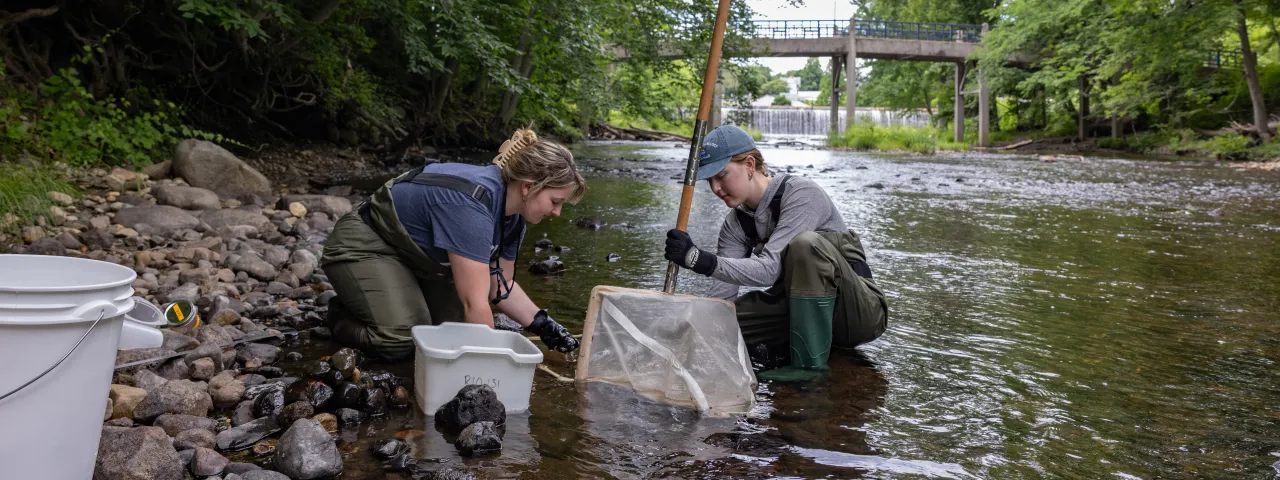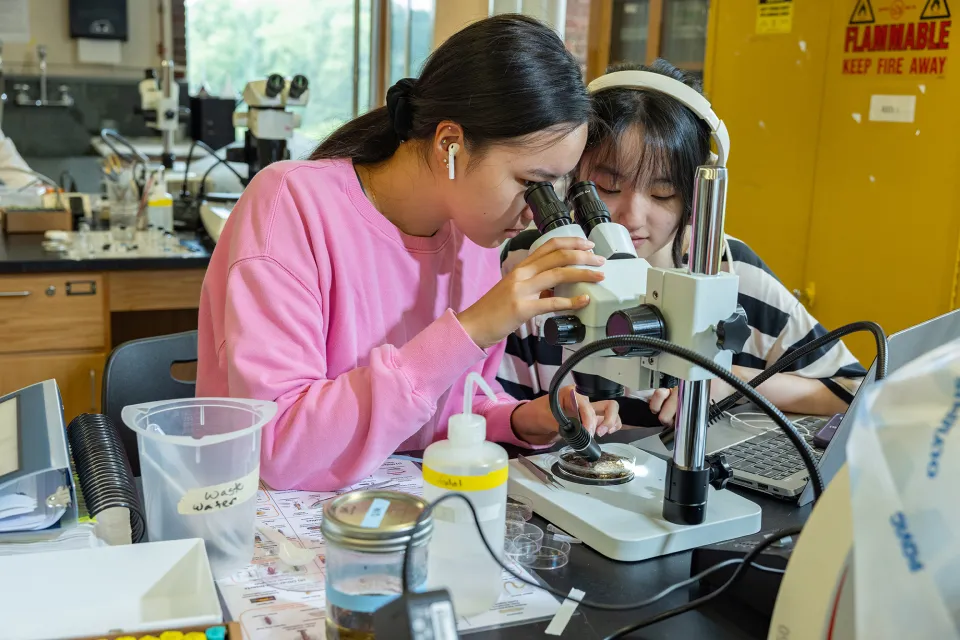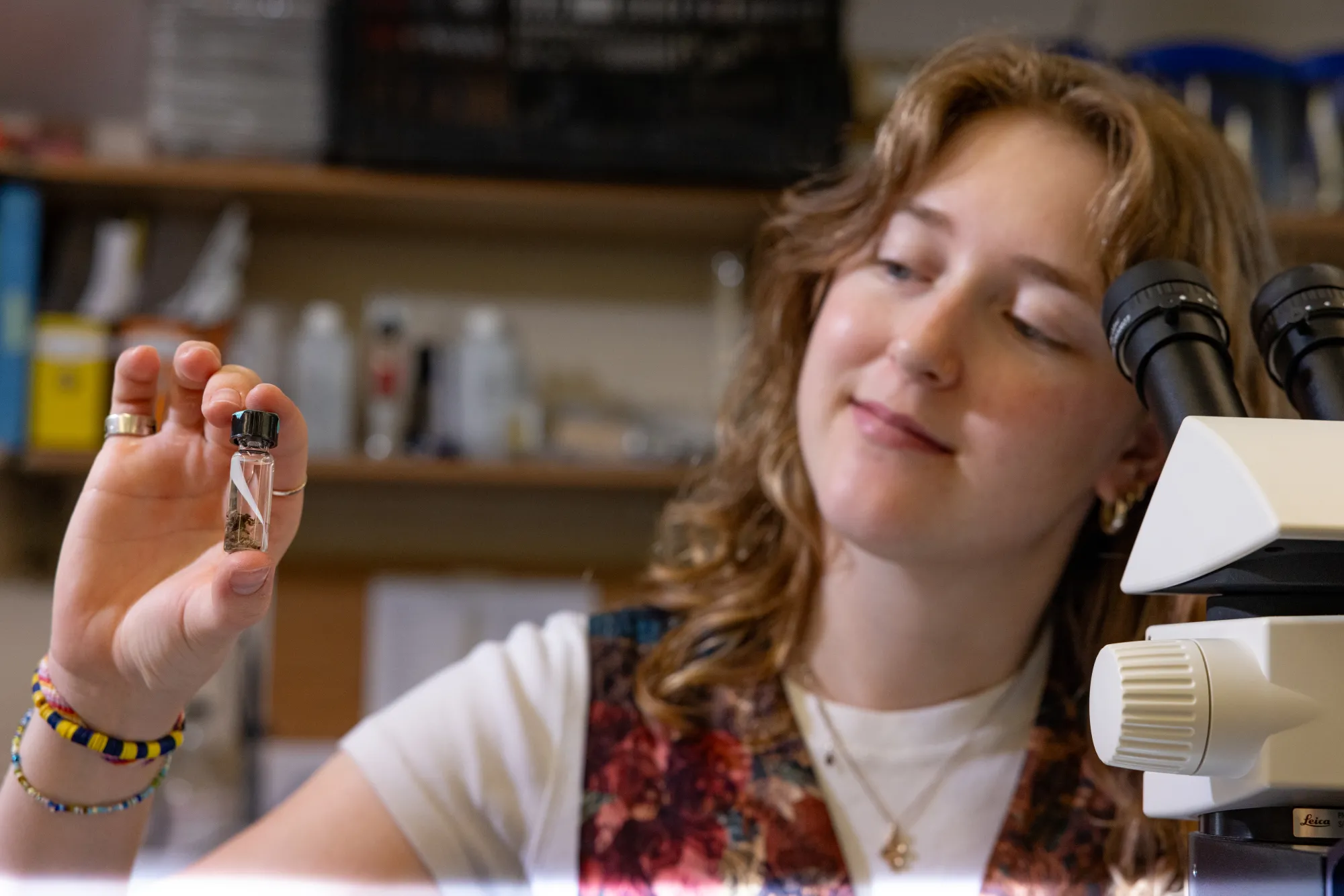Undergraduate Research
Undergraduate research extends learning beyond the classroom, providing students with exciting opportunities to investigate pressing questions in science. At the heart of the Smith experience is active engagement, driven by faculty-mentored research across a wide variety of academic disciplines. About half of Smith’s STEM majors conduct research with Smith professors. By joining a research lab, students gain authentic experience applying the scientific method, are exposed to the greater scientific community and contribute to long-term discovery.
Explore Research
Before getting started in research, consider why you are hoping to do research. Research is a great way to get hands-on experience working in research teams, but it can also be a substantial time commitment. There are different ways to conduct research on campus—for example, as a volunteer in a lab, for academic (special studies) credit, as a work-study job, or as a summer (SURF) or senior year thesis project.
Additionally, the CITI Program is available to all students and offers multiple certifications in the responsible conduct of research, including human subjects and animal use research. Learn more about creating an account with the CITI Program.
Types of Research
| Type of Research | Description |
|---|---|
| Research scholarships | The AEMES and STRIDE programs at Smith provide a limited number of funded research opportunities on campus to incoming students during their first and second years. |
| Volunteer | Volunteering is a good lower-commitment way to explore whether research in a particular lab is a good fit for you and to get to know the topics and process in that lab. |
| SURF | Smith students can apply to conduct 10-week Summer Undergraduate Research Fellowships (SURF) in research labs across campus. |
| Special Studies | Smith offers 1-4 credits for supervised independent research projects during the academic year. Research students conduct special studies research in labs across campus. |
| Work-Study | A limited number of work-study paid research opportunities are available for eligible students in select labs. |
| Senior Honors Thesis | A senior thesis is a yearlong project that allows students to engage in all aspects of the research process at length. These projects are often the culmination of research started in the sophomore or junior year, and/or summer SURF research. Students with financial need can apply to the McKinley Honors Fellowship Program. |
General Guidelines
Students in most departments/programs typically find research opportunities by contacting specific faculty members whose research is of interest. See information on emailing your professors in the “Getting Started” section below.
Physics
The Physics department has a Google form students can complete if they are interested in pursuing research, where you can indicate multiple professors whose research interests you. The department then tries to match students with faculty who have positions available.
Biology
The Biological Sciences department has a Google Form that students can complete if they are interested in doing research with BIO faculty but have yet to join a research group or connect with a faculty research advisor. The department will review all forms and do our best to match students with faculty who have positions available for SURF and academic-year research opportunities.
Below are research labs that provided information for listing here:
Elisabeth Armstrong (SWG) | Transnational women’s movement with an emphasis on rural women
Shannon Audley (EDC) | Understanding how schools, teachers, and students reinforce justice and injustice
Carrie Baker (AMS/SWG) | Writing, researching, and editing projects for Ms. magazine.
Michael Barresi (BIO/NSC) | Lab Website | Developmental biology, neurogenesis, neuron-glia interactions
Reid Bertone-Johnson (LSS) | Lab Website | Parks, bicycles, bikes, alternative transportation, pop-up, tactical urbanism, urban design, Northampton
Nalini Bhushan (PHI); Jay L. Garfield (PHI/LOG) | Translation of K.C. Bhattacharya’s Subject as Freedom
David Bickar (CHM/NSC/BCH) | Protein structure, neurochemistry, Parkinson’s Disease
Joshua Birk (HST) | Project-focused approach to working with medieval material
Maleka Donaldson (EDC) | How teachers and students respond to mistakes in educational contexts
Dawn Fulton (FRN) | Antiracist activism in France with a focus on social media
Leslie-Ann Giddings (CHM/BCH) | Lab Website | Natural products chemistry, biosynthesis, enzymology, metagenomics, extreme environments, bioactive secondary metabolites
Christophe Golé (MTH) | Plant math research: building models of phyllotaxis, collecting and analyzing plant data patterns, outreach
Alicia Grubb (CSC/SDS) | Personal Website | Requirements and software engineering, ethics, decision support
Andrew Guswa (EGR) | Hydrology, water, water resources, mathematical modeling
Mary Harrington (NSC/PSY) | Lab Website | Circadian rhythms, light
Virginia Hayssen (BIO/NSC) | Evolution of mammalian reproduction, pleiotropy, species descriptions
Nick Howe (CSC) | CS page | Handwriting recognition, document analysis, computer vision, machine learning, digital humanities
Laura Katz (BIO) | Lab Website | Genome evolution and biodiversity of eukaryotic microbes, bioinformatics
Leslie King (SOC) | Environmental sustainability in the corporate sector
Katherine Kinnaird (CSC/SDS) | Personal Website | Music information retrieval, machine learning, cultural analytics, data science education
Getting Started
Students Talk
“I’ve definitely learned how to work with other people. Working on a team is a big part of research.”
“You know, when you like what you’re doing, it’s not time-consuming.”



